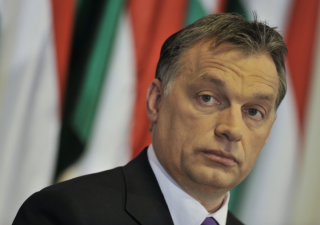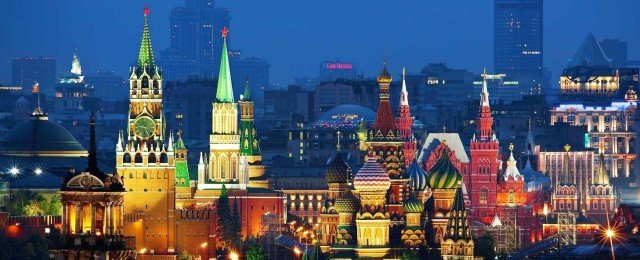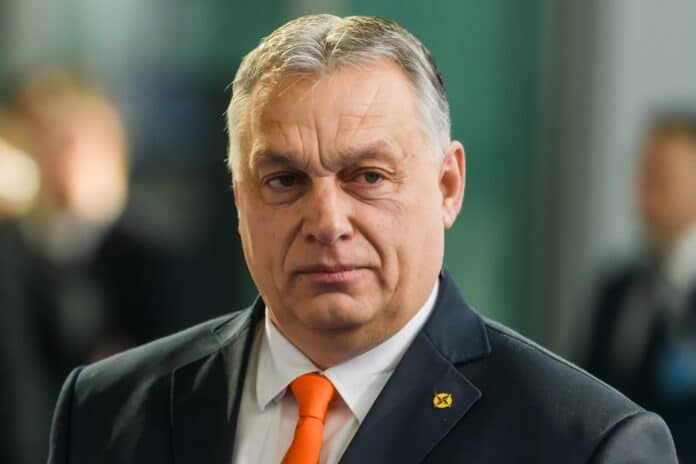- [ Editor’s Note: We have a crystal clear view now of the plan to subvert any East European government which will not become a pawn for US foreign policy… so much for the scam of spreading freedom and democracy. It is nothing more than Neo-Imperialism.
I still cannot understand why these countries do not kick the color revolution NGOs out, or charge them with espionage for working to overthrow the government.
We are way past the bogus claim that such utterances are just conspiracy theories. The Washington political gangs are conspiring before they even get out of the shower in the morning.
But the West holds a spider’s web of control levers over them, like the threat of sanctions over made-up charges, cyber warfare, and don’t forget the major new weapon of the West… terrorism. There has been too much kid-glove treatment of the Western-sponsored regime change warfare and state-sponsored terrorism.
All those doing this are literally attacking whomever they want while remaining in good standing in all the international organizations like the UN, making it a farce for everything it stands for. That said, where is the world public demand that we need penalties for such crimes?
The ones on the books for the little terrorists include confiscation of all assets. So the catch is the State actors abuse their diplomatic immunity to give themselves free terror passes. You know who they are. And then they claim anyone who will not submit is a threat, and subject to a “military solution”. You just can’t make this stuff up… Jim W. Dean ]
– First published … November 21, 2014 –

by F. William Engdahl, with New Eastern Outlook, Moscow
Hungary and its populist nationalist Prime Minister Viktor Orbán have come into the cross-hairs of Washington’s political elites.
His sin?… not buckling under to the often destructive diktats of the Brussels EU Commission; attempting to define a Hungarian national identity.
But his cardinal sin is his deepening relationship with Russia and his defiance of Washington in signing an agreement with Gazprom for bringing the Russian South Stream gas pipeline into the EU via Hungary.
Orbán has himself undergone a political journey since he was elected as Hungary’s second-youngest Prime Minister in 1998. Back then he oversaw the entry of Hungary along with Poland and the Czech Republic into NATO over Russia’s protest, and into the EU.
As Prime Minister during far more prosperous economic times in the EU, Orbán cut taxes, abolished university tuition for qualified students, expanded maternity benefits, and attracted German industry with low-cost Hungarian labor.
One of his American “advisers” then was James Denton, linked with the Color Revolution Washington NGO, Freedom House. Orban seemed the darling of Washington’s neo-cons. In 2001 he was given the neoconservative American Enterprise Institute’s Freedom Award.
But in 2010 after six years in the opposition, Orbán returned, this time with a resounding majority for his Fidesz-Hungarian Civic Union Party, Fidesz for short. In fact Fidesz won a 68% supermajority in Parliament, giving it the necessary votes to alter the Constitution and pass new laws, which it did.
Ironically, in the case of the pot calling the kettle black, the United States Obama Administration and the European Parliament for placing too much power in the hands of Fidesz. Orbán was accused by Daniel Cohn-Bendit of the European Greens of making Hungary on the model of Venezuela’s Hugo Chavez. He was definitely not playing by the approved Brussels Rulebook for politically submissive EU politicians.
Fidesz began to be demonized in EU media as the Hungarian version of United Russia and Orbán as the Hungarian Putin. That was in 2012. Now it’s getting alarming for the Atlanticists and their EU followers.

Orbán has defied EU demands to stop the construction of Russia’s important South Stream gas pipeline. Russia’s South Stream gas pipeline would guarantee EU gas together with German-Russian Nord Stream that could bypass the war in Ukraine — something Washington bitterly opposes for obvious reasons.
Last January, his government announced a € 10 billion deal with the Russian state nuclear energy company to refurbish Hungary’s only nuclear power plant at Paks, originally built during the Soviet era with Russian technology.
That caused some attention in Washington. Similarly when Orban criticized the United States this past summer for failing to ultimately resolve the global financial crisis its banks and its lax regulation caused and praised China, Turkey and Russia as better models.

He declared in words not too different from what I have often used that Western democracies, “will probably be incapable of maintaining their global competitiveness in the upcoming decades and will instead be scaled down unless they are capable of changing themselves significantly.”
In addition, Orbán’s government managed to free Hungary from decades of devastating IMF bondage. In August 2013, the Hungarian Economic Ministry announced that it had, thanks to a “disciplined budget policy,” repaid the remaining €2.2 billion owed to the IMF. No more onerous IMF-forced state privatizations or conditionalities.

The head of the Hungarian Central Bank then demanded the IMF close its offices in Budapest. In addition, echoing Iceland, the State Attorney General brought charges against the country’s three previous prime ministers because of the criminal amount of debt into which they plunged the nation.
That’s a precedent that surely causes cold sweat in some capitals of the EU or Washington and Wall Street.
But the real alarm bells rang when Orbán and his Fidesz party approved a go-ahead, together with neighboring Austria, of the South Stream Russian pipeline, ignoring EU claims it violated EU rules.
Orbán proclaimed at a meeting with Germany’s Horst Seehofer in Munich on November 6, “Es lebe die österreichisch-ungarische Energiemonarchie” („The Austro-Hungarian Energy Monarchy Lives.“)
The US elites sounded the alarm immediately. The ultra-establishment New York Times ran a lead editorial, “Hungary’s Dangerous Slide.”
They declared, “The government of Prime Minister Viktor Orbán of Hungary is sliding toward authoritarianism and defying the fundamental values of the European Union — and getting away with it.”

The Times revealed the real cause of Washington and Wall Street alarm: “Hungary’s most recent expression of contempt for the European Union is its passage of a law on Monday that clears the way for Russia’s South Stream natural gas pipeline to traverse Hungary.
The new law is in clear violation of the European Parliament’s call in September for member states to cancel South Stream and of the economic sanctions against Russia imposed by the European Union and the United States after Russia’s actions in Ukraine.
Instead of issuing tepid expressions of concern over anti-democratic policies, the European Union should be moving to sanction Hungary. Jean-Claude Juncker, the president of the European Commission, should exercise his power to force Mr. Navracsics to resign.”
Tibor Navracsics has just been named the new European Commissioner of Education, Culture, Youth and Sport, a post in Brussels that has arguably little to do with gas pipelines.
Next, we can expect the National Endowment for Democracy and the usual US Government-backed NGOs to find an excuse to launch mass opposition protests against Fidesz and Orbán for his unforgivable crime of trying to make Hungary’s energy independent from the US-created insanity in Ukraine.
F. William Engdahl is a strategic risk consultant and lecturer holding a degree in politics from Princeton University, and is a best-selling author on oil and geopolitics; exclusively for the online magazine “New Eastern Outlook.”
Editing: Jim W. Dean and Erica P. Wissinger


Frederick William Engdahl (born August 9, 1944) is an American writer, economics researcher, historian, and freelance journalist.
He is the author of the best-selling book on oil and geopolitics, A Century of War: Anglo-American Oil Politics and the New World Order. It has been published as well in French, German, Chinese, Russian, Czech, Korean, Turkish, Croatian, Slovenian, and Arabic. In 2010 he published Gods of Money: Wall Street and the Death of the American Century, completing his trilogy on the power of oil, food, and money control.
Mr. Engdahl is one of the more widely discussed analysts of current political and economic developments, and his provocative articles and analyses have appeared in numerous newspapers and magazines and well-known international websites. In addition to discussing oil geopolitics and energy issues, he has written on issues of agriculture, GATT, WTO, IMF, energy, politics, and economics for more than 30 years, beginning the first oil shock and world grain crisis in the early 1970s. His book, ‘Seeds of Destruction: The Hidden Agenda of Genetic Manipulation has been translated into eight languages. A new book, Full Spectrum Dominance: Totalitarian Democracy in the New World Order describes the American military power projection in terms of geopolitical strategy. He won a ‘Project Censored Award’ for Top Censored Stories for 2007-08.
Mr. Engdahl has lectured in economics at the Rhein-Main University in Germany and is a Visiting Professor in Economics at Beijing University of Chemical Technology.
After a degree in politics from Princeton University (USA), and graduate study in comparative economics at the University of Stockholm, he worked as an independent economist and research journalist in New York and later in Europe, covering subjects including the politics of energy policy in the USA and worldwide; GATT Uruguay Round trade talks, EU food policies, the grain trade monopoly, IMF policy, Third World debt issues, hedge funds, and the Asia crisis.
Engdahl contributes regularly to a number of international publications on economics and political affairs including Asia Times, FinancialSense.com, 321.gold.com, The Real News, Russia Today TV, Asia Inc., GlobalResearch.com, Japan’s Nihon Keizai Shimbun, Foresight magazine. He has been a frequent contributor to the New York Grant’sInvestor.com, European Banker and Business Banker International and Freitag and ZeitFragen in Germany, Globus in Croatia. He has been interviewed on various geopolitical topics on numerous international TV and radio programs including Al Jazeera, CCTV and Sina.com (China), CCTV (China) Korea Broadcasting System (KBS), and RT Russian TV. He is a Research Associate of Michel Chossudovsky’s well-respected Centre for Research on Globalization in Montreal, Canada, and a member of the editorial board of Eurasia magazine.
Mr. Engdahl has been a featured speaker at numerous international conferences on geopolitical, GMO, economic, and energy subjects. Among them is the Ministry of Science and Technology Conference on Alternative Energy, Beijing; London Centre for Energy Policy Studies of Hon. Sheikh Zaki Yamani; Turkish-Eurasian Business Council of Istanbul, Global Investors’ Forum (GIF) Montreaux Switzerland; Bank Negara Indonesia; the Russian Institute of Strategic Studies; the Chinese Ministry of Science and Technology (MOST), Croatian Chamber of Commerce and Economics.
He currently lives in Germany and, in addition to teaching and writing regularly on issues of international political economy and geopolitics, food security, economics, energy, and international affairs, is active as a consulting political risk economist for major European banks and private investors. A sample of his writings is available at Oil Geopolitics.net
ATTENTION READERS
We See The World From All Sides and Want YOU To Be Fully InformedIn fact, intentional disinformation is a disgraceful scourge in media today. So to assuage any possible errant incorrect information posted herein, we strongly encourage you to seek corroboration from other non-VT sources before forming an educated opinion.
About VT - Policies & Disclosures - Comment Policy




